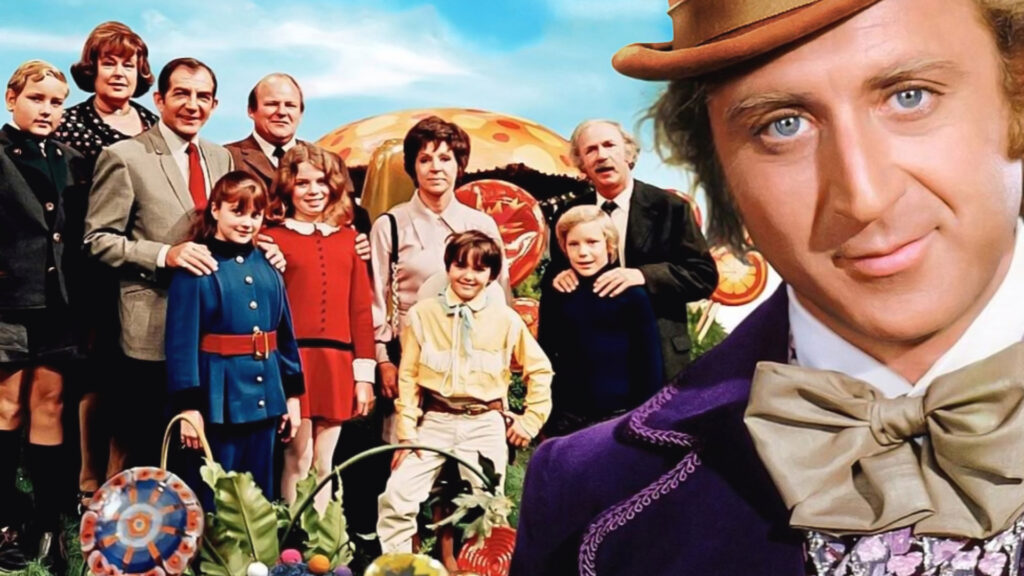
In 1971, Willy Wonka and the Chocolate Factory was a flop.
Lucky me.
Channel 7 aired The 4:30 Movie and each week I was enthralled by films that spanned all genres and all time periods: Dracula, The Magnificent Seven, The Creature from the Black Lagoon, Gigi, and, to be honest, a horror film that still scares the bejeezus out of me to this day, Carnival of Souls. For a complete list of the movies shown, see Wayback Machine. One day, as I remember it any way, Willy Wonka and the Chocolate Factory aired, and my life was never the same. Okay, to be honest, I’m not sure that’s when I first saw it, I just remember the thrill of watching movies after I finished my homework. It’s more likely I saw the film when it debuted on NBC in 1974.
Be that as it may, to this day the film makes me smile, dark overtones aside, because it’s real. From the opening scene in a candy shop that looks just like the Woolworth’s I remember with wooden floors and penny candy, to the yearning of a child for more. And the idea that if you just follow the rules, respect the rules, well you may be deserving of a golden ticket.
While most reviews of the film focus on sequencing the plot and analyzing the characters, I want to focus more on the emotional impact of the film. Why, in my opinion, it still resonates with the viewer.
Who doesn’t want to win a chocolate factory? No one searching for a golden ticket actually knew that the factory was the prize. All they knew was that Willy Wonka was finally, after years as a recluse, going to let five lucky ticket holders into the factory. That, believe it or not, was the prize. That and a lifetime supply of chocolate.
The search for the tickets is the viewer’s introduction to each of the ultimate ticket holders: Augustus Gloop, he of the endless eating; Veruca Salt, a brat if ever there was one; Violet Beauregard, whose endless gum chewing was indicative of bad manners; Mike Teevee who “couldn’t have a gun” until he was twelve; and finally, Charlie Bucket, the epitome of kindness.
As Gene Wilder once said, each of the naughty children would get their comeuppance, including Charlie to a degree. And children not only understood why, they expected it. The emotional core of the film was built on the character, or lack thereof, of each child. A visceral response was a given.
The viewer is first introduced to Charlie, a poor boy who lives with his mother and two sets of grandparents. As an aside, I just want to say that the grandparents sharing the same bed, clad in their nighties, was creepy! In any case, once the announcement is made that Willy Wonka was going to open his factory to five people who found a golden ticket in a bar of Wonka chocolate, the viewer felt sorry for Charlie. Or as least I hope that was the case. While the rest of the world frantically bought Wonka bars, Charlie only had two to open. One he purchased with money he earned and the other given to him as a birthday gift from Grandpa Joe (who gave up his cigars to buy it…talk about an emotional tug of the heartstrings!) It is here that the film’s overall emotional core is built.
Charlie, by that ever-present stroke of luck, finds money and is able to buy two Wonka bars. Of course, as we all knew, he’d open the second bar only to discover he had a golden ticket. He asks Grandpa Joe to go with him to the factory and after a spirited dance, the film cuts to the crowd outside Mr. Wonka’s factory.
When he finally appears, he limps to the gate, leaning on his cane. Suddenly, he does a front roll, stands up, extends his arms and welcomes the winners to his factory. Gene Wilder is reported to have said he chose to make that entrance to keep the children, but more importantly the audience off guard. As with the surprises around each corner of the factory, one never knew what to expect. And that, in part, was the magic. To be frank, I never knew what to make of Gene Wilder’s expressive face. I was sometimes entranced and often a bit terrified. Nevertheless, I wanted to be a witness, via the movie screen, to the enchantments in the factory.
And then the Oompa Loompas appeared.
In one version of Roald Dahl’s book, they were described as black pygmies from “the deepest and darkest part of the African jungle.” Needless to say, this posed a problem for the screen adaption which was not many years removed from the Civil Rights movement. The decision to change them to orange-faced people with dwarfism might be considered equally offensive. For an interesting take on this subject, please see “From pygmies to puppets: what to do with Roald Dahl’s enslaved Oompa-Loompas in modern adaptations?”
Given the discussions around these characters, how then does one handle their presentation in the film. One that even casual watchers of the film are familiar with given the lyrics and music of Anthony Newley & Leslie Bricusse:
Oompa Loompa, do-ba-dee-doo,
I’ve got a perfect puzzle for you.
Oompa Loompa, do-ba-dee-dee,
If you are wise you’ll listen to me.
What do you get when you guzzle down sweets?
Eating as much as an elephant eats.
What are you at getting terribly fat?
What do you think will come of that?
I don’t like the look of it
Oompa Loompa do-ba-dee-da,
If you’re not greedy you will go far.
You will live in happiness too,
Like the oompa loompa do-ba-dee-doo.
Do-ba-dee-doo(Violet)
Oompa Loompa, do-ba-dee-doo,
I’ve got another puzzle for you.
Oompa Loompa, do-ba-da-dee,
If you are wise you’ll listen to me.
Gum chewing’s fine when it’s once in a while.
It stops you from smoking and brightens your smile.
But it’s repulsive revolting and wrong.
Chewing and chewing all day long.
The way that a cow does
Oompa Loompa do-ba-dee-da,
Given good manners you will go far.
You will live in happiness too,
Like the oompa loompa do-ba-dee-doo.(Veruca)
Oompa Loompa doompadee doo
I’ve got another puzzle for you
Oompa Loompa doompadee dee
If you are wise you will listen to me
Who do you blame when your kid is a brat
Pampered and spoiled like a Siamese cat?
Blaming the kids is a lie and a shame
You know exactly who’s to blame:
The mother and the father!
Oompa Loompa doompadee dah
If you’re not spoiled then you will go far
You will live in happiness too
Like the Oompa Loompa doompadee do(Mike)
Lyrics on Demand
Oompa Loompa doompadee doo
I’ve got another puzzle for you
Oompa Loompa doompa dah dee
If you are wise you’ll listen to me
What do you get from a glut of TV?
A pain in the neck and an IQ of three
Why don’t you try simply reading a book?
Or could you just not bear to look?
You’ll get no
You’ll get no
You’ll get no
You’ll get no
You’ll get no commercials
Oompa Loompa Doompadee Dah
If you’re not greedy you will go far
You will live in happiness too
Like the Oompa
Oompa Loompa doompadee do (doompadee do)
And this brings us to another discussion of the film’s overall emotional core. Willy Wonka wants to give the factory to a child who will appreciate it and, just as importantly, take care of the Oompa Loompas. In the end, he says, “I can’t go on forever and I don’t really want to try.” He believed, quite deeply it is clear, that only a child could be trusted with his secrets and with his most valuable treasures and friends.
After taking the children, and not a few adults, on a journey, Willy Wonka reassures Charlie that when the other children leave the factory, they will be just fine, “completely restored to their normal terrible selves. But maybe they will be a little bit wiser for the wear.”
Cruel, perhaps, for some, but not without merit.
The film itself is ultimately concerned with what makes us who we are, including our dreams. This is the emotion we are asked to concern ourselves with.
One character even notes that “to believe in one’s dreams is a manifestation of insanity.”
Perhaps we all should consider going mad every now and then such that our dreams become realities and our realities become dreams.
